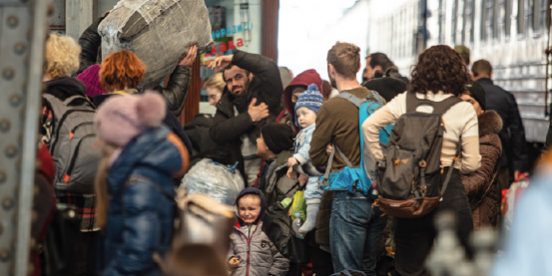by Gerald Knaus, Founding Chairman of the European Stability Initiative (ESI), Berlin
The Russian invasion of Ukraine represents a turning point in European history. The leader of a nuclear power justifies the use of force and attacks a neighbouring democracy by arguing that the national identity of its people is artificial and deserves to be destroyed. Civilians in peaceful suburbs are executed. Hospitals and theatres are bombed. Mariupol, a city the size of Liverpool or Dresden, is destroyed within weeks. After only two months of war, an estimated 4 million Ukrainians have fled to the European Union alone. While a few are already returning to join husbands and fathers, following the failure of the first Russian offensive, many more remain at risk of further displacement as the next Russian offensive gets underway. While the war continues, an even larger number is likely to reach the European Union in search of protection.
Stop violating the Geneva Refugee Convention
This Ukrainian refugee crisis takes place against the backdrop of a deep crisis in international refugee protection. The 1951 Geneva Refugee Convention introduced a radical idea: states should give protection to anyone, regardless of nationality, who has “a well-founded fear of being persecuted for reasons of race, religion, nationality, membership of a particular social group or political opinion.” And yet, for many years, even democratic governments around the world, from Australia to the USA, from Greece and Croatia to Poland at its border with Belarus, have been violating the non-refoulement (no push-back) principle enshrined in the 1951 Convention.
All governments are entitled to control their borders. They are also allowed to return people who have no right to stay. However, democracies decided decades ago that they would only do so by following legal procedures. Thus, democracies need humane ways of controlling borders without breaching fundamental rights; ways to reduce irregular migration without pushbacks and human-rights breaches; and ways to admit legally those in need of protection.
This requires a positive vision of global refugee protection in the 21st century. Discouraging irregular migration through agreements with third countries can be legitimate if it respects the Refugee Convention. But protection must also be offered. Democracies should commit to resettling more refugees and they should keep borders open for those who can find no other place of safety. And they should cooperate in doing so.
The response to Ukrainian refugees in Europe today matters hugely. All European countries, except the United Kingdom, already allow Ukrainians to enter visa free. The EU’s reaction to their plight was historic: with the activation of the EU Temporary Protection Directive all those fleeing from Ukraine have the right to reside, work and receive support anywhere in the EU. There is no need for smugglers, no dangerous irregular crossings, no long wait for slow asylum procedures. The reception of (so far mainly) women and children from Ukraine creates an opportunity to show how a humane European asylum policy might work even with unusually large numbers.
Provide better information to refugees
However, such a system requires more than empathy. It requires organisation. Throughout Europe, from Norway to Moldova, many have shown a willingness to welcome Ukrainians. Everywhere there are cities and citizens willing to help. This makes it possible to mount an unprecedented effort to relocate Ukrainian refugees. An EU-wide special fund that can unbureaucratically and directly compensate local authorities for each registered Ukrainian, The Facility for Ukrainian Refugees in Europe has been established. There is a similar programme in the UK. But refugees are not parcels to be distributed against their will. Support must be offered to those who arrive in Poland and Slovakia, including information about how to get to, and conditions in, Finland or Ireland, France or Portugal. Without information few refugees will cross the continent and will remain in (some) border states, where cities are at risk of being overwhelmed. More Ukrainians have applied for temporary protection in the Czech Republic than in France, Spain and Italy put together. Warsaw hosts ten times more refugees than the UK has admitted.
Send a powerful message
If Europeans welcome millions of Ukrainian refugees, while restoring respect for the Refugee Convention at their external borders, they send a powerful message: democracies can respond in a humanitarian way to autocratic pressure, as the allies did during the Berlin airlift of 1948, faced with Stalin’s blockade and blackmail. A humane response to Putin’s war in 2022 is not only to help his victims but also to make a powerful statement about the value of human dignity in the face of a historic tragedy.







